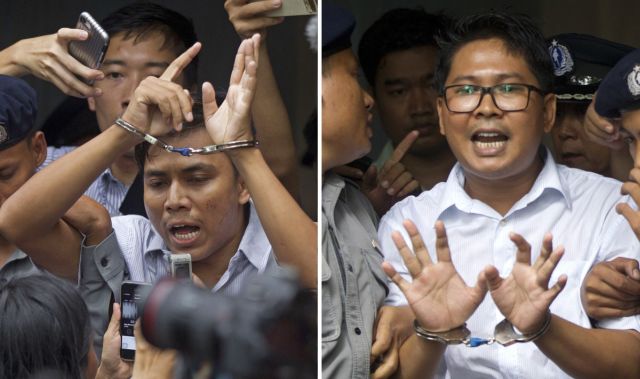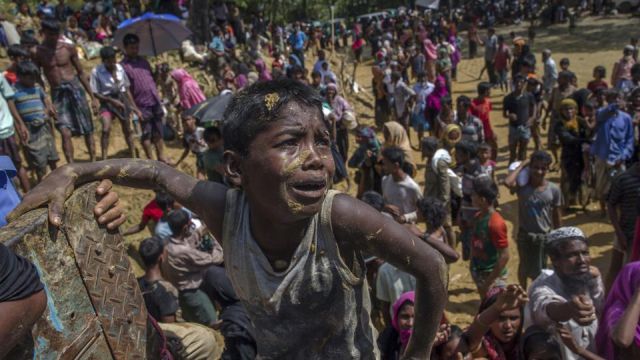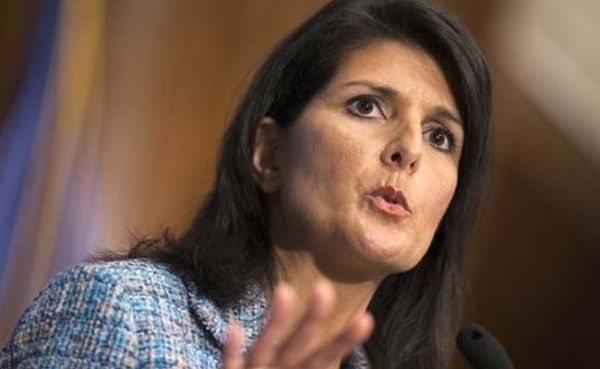
by admin | May 25, 2021 | World
 Yangon : Two Reuters journalists sentenced to seven years in prison for violating Myanmar’s Official Secrets Act while investigating the killing of Rohingya in the country lodged an appeal on Monday.
Yangon : Two Reuters journalists sentenced to seven years in prison for violating Myanmar’s Official Secrets Act while investigating the killing of Rohingya in the country lodged an appeal on Monday.
Than Zaw Aung, a defence lawyer representing the two Myanmar journalists Wa Lone, 32, and Kyaw Soe Oo, 28, told Efe news that he filed the appeal at the Yangon’s High Court.
According to the lawyer, the journalists have a chance of being released by the court, although he did not rule out going to the Supreme Court if the verdict issued on September 3 is maintained.
The president and editor-in-chief of Reuters, Stephen J. Adler, said in a statement that “in condemning them as spies, it ignored compelling evidence of a police set-up, serious due process violations, and the prosecution’s failure to prove any of the key elements of the crime”,
Adler also urged Myanmar “to uphold its stated dedication to rule of law, freedom of the press, and democracy by ordering the release of our colleagues”,
Wa Lone and Kyaw Soe Oo were arrested on the night of December 12, 2017, in possession of confidential documents which, according to them, had just been handed over by two police officers whom they had met.
The reporters were investigating a massacre of the Rohingya minority in the village of Inn Dinn in Rakhine state.
Authorities accused them both, under the colonial-era Official Secrets Act, of having obtained secret documents about the military operation in Rakhine, which the Burmese army had launched following the series of attacks by an insurgent Rohingya group against border posts on August 25, 2017.
Around 725,000 Rohingya fled to Bangladesh following the violent military offensive in which UN investigators found elements of genocide, crimes against humanity and war crimes.
—IANS

by admin | May 25, 2021 | Muslim World
 Dhaka : The UN World Food Programme (WFP) on Wednesday said that it needs more funds to continue assisting the hundreds of thousands Rohingya refugees, who have been living in Bangladesh camps after fleeing an offensive by the Myanmar military last year.
Dhaka : The UN World Food Programme (WFP) on Wednesday said that it needs more funds to continue assisting the hundreds of thousands Rohingya refugees, who have been living in Bangladesh camps after fleeing an offensive by the Myanmar military last year.
The WFP said it had spent around $20 million to assist the refugees in Bangladesh following the crackdown in Myanmar in August 2017.
“We are here to highlight the plight of families of Rohingyas so that governments around the world do not forget about their needs. The international community stepped up in a successful way… but pretty soon we will need more money,” said WFP Executive Director David Beasley in a press conference.
Beasley said the shortage of funds was owing to the fact that “in the last two years the number of civilian hungry people in the word rose from 80 million to 224 million, primarily driven by man-made conflict whether we talk about Syria, Iraq, Yemen, South Sudan, Nigeria or North East Nigeria”, Efe news reported.
The WFP usually imports emergency supplies from outside the country but in the case of Bangladesh, the agency has been trying to integrate into the local economy, said Beasley, adding that the WFP has been buying around $10 million worth of products monthly from Bangladesh.
Beasley also said that the situation had improved in the refugee camps since his visit last year.
Meanwhile, on Tuesday, Bangladesh announced that it will begin to repatriate the Rohingyas to Myanmar around the middle of November. The announcement came nearly a year after both the countries signed a repatriation agreement in November 2017.
The Rohingya exodus had began after the Myanmar military launched the August offensive in Rakhine state following attacks on multiple government posts by Rohingya rebels.
The offensive was globally condemned for its rights abuses including loot, torture, rapes and torching of entire Rohingya villages. The UN called it “ethnic cleansing”.
—IANS

by admin | May 25, 2021 | World

Nikki Haley
By Umar Farooq,
Washington: The U.S. on Monday announced giving over $185 million in additional aid to Rohingya relief efforts in Myanmar and Bangladesh.
The announcement was made by U.S. Ambassador to the UN Nikki Haley, at a meeting attended by Turkish Foreign Minister Mevlut Cavusoglu.
In a statement, Haley said the bulk of the aid would go towards helping Rohingya refugee communities in Bangladesh to support emergency services such as food, water, sanitation, health care and psychosocial support.
“Still more needs to be done, so we need other countries to do their part as well,” she said in the statement.
“This additional funding brings U.S. humanitarian assistance in response to the Rakhine State crisis to nearly $389 million since the outbreak of violence in August 2017,” read the statement.
Rohingya Persecution
Since Aug. 25, 2017, nearly 24,000 Rohingya Muslims have been killed by Myanmar’s state forces, according to a report by the Ontario International Development Agency (OIDA).
More than 34,000 Rohingya were also thrown into fires, while over 114,000 others were beaten, said the OIDA report, entitled Forced Migration of Rohingya: The Untold Experience.
According to Amnesty International, more than 750,000 Rohingya refugees, mostly children and women, have fled Myanmar and crossed into Bangladesh after Myanmar forces launched a crackdown on the minority Muslim community.
The Rohingya, described by the UN as the world’s most persecuted people, have faced heightened fears of attack since dozens were killed in communal violence in 2012.
The UN has documented mass gang rapes, killings — including of infants and young children — brutal beatings, and disappearances committed by Myanmar state forces. In a report, UN investigators said such violations may have constituted crimes against humanity.
—AA

by admin | May 25, 2021 | Media, World
 Yangon : Two Reuters reporters were jailed on Monday for seven years for violating a state secrets act during their reporting of the Rohingya crisis, a court said, in the case that has drawn outrage for its attack on media freedom.
Yangon : Two Reuters reporters were jailed on Monday for seven years for violating a state secrets act during their reporting of the Rohingya crisis, a court said, in the case that has drawn outrage for its attack on media freedom.
The two journalists were being tried since 2017 for breaching Myanmar’s Official Secrets Act while investigating violence against the Rohingya Muslims in the Rakhine state by the army, the BBC reported.
Reporters Wa Lone and Kyaw Soe Oo were arrested on the night of December 12, after meeting with two police officers who, according to the defendants, handed them confidential documents, the Efe news reported.
Since then, both have been held without bail and have appeared 30 times before the court, which started a preliminary investigation on January 9 and formally filed charges on July 9.
The case has been widely seen as a test of press freedom in Myanmar.
The journalists have maintained their innocence, saying they were set up by the police.
“I have no fear,” Lone, 32, said after the verdict. “I have not done anything wrong. I believe in justice, democracy and freedom.”
The two men, who both have families with young children, have been in prison since their arrest in December 2017.
“Today is a sad day for Myanmar, Reuters journalists Wa Lone and Kyaw Soe Oo, and press freedom anywhere,” said Reuters editor-in-chief Stephen Adler.
Judge Ye Lwin told the court in Yangon the pair had “intended to harm the interests of the state”. “And so they have been found guilty under the state secrets act,” he said.
Lone and Soe Oo, 28, had been collecting evidence about the execution of 10 men by the army in the village of Inn Din in northern Rakhine.
During their investigation, they were offered the documents by two police officers, but were arrested immediately afterwards for the possession of those documents.
Authorities later launched their own probe into the killings, confirming the massacre took place and promising to take action against those who had taken part.
The BBC said that many would see this verdict as a crushing blow to freedom of the press in Myanmar and another setback for the democracy, three years after Aung San Suu Kyi’s party triumphed in free elections.
He said Lone and Soe Oo bowed their heads as the verdict was delivered. Wa Lone – who has missed the birth of his first child while being detained — protested his innocence once again as he was led away.
“We are extremely disappointed by this verdict,” Britain and the US have said, saying the court’s decision was “deeply troubling for everybody who has struggled so hard here for media freedom”.
The UN’s resident and humanitarian co-ordinator in Myanmar Knut Ostby said the UN had “consistently called for the release” of the journalists and that “a free press is essential for peace, justice and human rights for all. We are disappointed by today’s court decision”.
“The outrageous convictions show Myanmar courts’ willingness to muzzle those reporting on military atrocities,” Brad Adams, Asia director at Human Rights Watch, said.
“These sentences mark a new low for press freedom and further backsliding on rights under Suu Kyi’s government.”
The verdict comes a year after the crisis in Rakhine state came to a head when a Rohingya militant group attacked several police posts. The military responded with a brutal crackdown against the Rohingya minority.
The UN has said leading army figures in Myanmar should be investigated and prosecuted for genocide.
Media access to Rakhine is strictly controlled by the government so it is difficult to get reliable news from the region.
—IANS

by admin | May 25, 2021 | World
 By Arul Louis,
By Arul Louis,
United Nations : Describing the Rohingya refugee situation as one of the worst humanitarian and human rights crises of the past year, Secretary-General Antonio Guterres has called for international action to ensure Myanmar is held to account for the crimes of its security forces.
Speaking at a Security Council session convened on Tuesday for the one-year anniversary of the start of the exodus of 720,000 Rohingyas to Bangladesh, Guterres also condemned the attacks by extremists against the security forces.
However, he added that nothing can ever justify the disproportionate use of force against civilians and the horrendous violation of human rights violations by the security forces.
Urging united action by the divided Security Council, Guterres cited a report issued on Monday by a UN Human Rights Council (UNHRC) fact-finding team and said the human rights abuses amounted to “the gravest crimes under international law”.
He thanked the Bangladesh government for its generosity in hosting the refugees and said more needs to be done by the world community as only 33 per cent of the $951 million UN appeal for assistance has been met and the the monsoon season looms.
The current crisis began in August 2017 with attacks on Myanmar security posts by the Arakan Rohingya Salvation Army (ARSA), which is led by Karachi-born Ata Ullah.
The Myanmar armed forces and vigilantes retaliated brutally against the Rohingyas starting an exodus that began on August 25.
Tariq Mahmood Ahmad, the British Minister of State for the UN, who presided over the Security Council session, said that it should be prepared to use all the tools it has to ensure justice for the Rohingyas.
The strongly-worded report by the UNHRC team headed by former Indonesian attorney-general Marzuki Darusman said that allegations of genocide against Myanmar officials should be referred to the International Criminal Court (ICC) or to a special tribunal.
The Netherlands and Sweden backed the suggestion and asked the Security Council to refer the matter to the ICC.
But Russia and China countered saying that the situation required a non-confrontational approach and only a bilateral diplomatic solution involving Myanmar and Bangladesh would work.
Myanmar’s Permanent Representative Hau Do Suan said that his country did not accept the findings of the UNHRC team as it was biased.
However, he added that Myanmar does not condone human rights abuses and would take action against anyone guilty if there was evidence of their conduct.
He alleged that the ARSA had set up terrorist bases in some areas along the border with Bangladesh.
Bangladesh Permanent Representative Masud Bin Momen said that in the light of the UNHRC team’s report, it was imperative that the Security Council should act decisively.
He said that the Rohingyas could not return to their homes in Rakhine state unless they were assured of their safety.
For this, the Myanmar government should take several steps like curbing hate speech, allowing free access to UN agencies for relief operations and dismantling internal camps for Rohingyas and giving them freedom of movement.
Australian-born actor Cate Blanchett, who is a Goodwill Ambassador for the UN High Commissioner for Refugees, spoke at the Security Council session about her encounters with Rohingya refugees who told her harrowing tales of their experiences in Myanmar.
She said that as a mother she was moved by the plight of the children she met as she saw her children reflected in them.
(Arul Louis can be reached at arul.l@ians.in)
—IANS

 Yangon : Two Reuters journalists sentenced to seven years in prison for violating Myanmar’s Official Secrets Act while investigating the killing of Rohingya in the country lodged an appeal on Monday.
Yangon : Two Reuters journalists sentenced to seven years in prison for violating Myanmar’s Official Secrets Act while investigating the killing of Rohingya in the country lodged an appeal on Monday.



